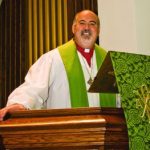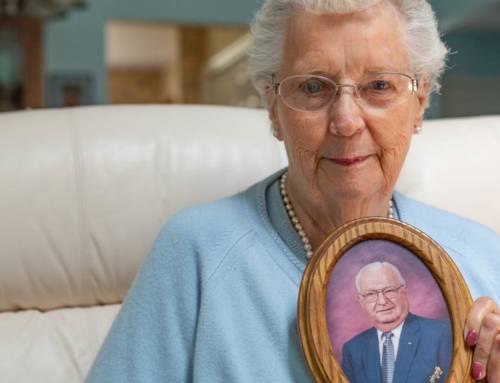
About the Author: Sunday Sermons from Sell Chapel are written by Rev. Preston Van Deursen, Director of Pastoral Care at the Masonic Village at Elizabethtown.
My family and I just came back yesterday from a weeks vacation and it was truly beautiful. There is probably not one of us that wanted to come back. It made me think of our lesson today…something about “where your heart is…” I was thinking of a line that kept going through my mind that would make a great country and western song…. When your lips are one place ….but your heart is somewhere else.
Jesus talks often about our treasures and our hearts. I am convinced that I can tell what is important to each of us here today by doing one simple thing….looking at one’s check book. Jesus also talks about our lips and our hearts when he says in the Gospel of Mark, “Isaiah was right when he prophesied about you hypocrites. As it is written, These people honor me with their lips but their hearts are far from me.” I wonder today if he is talking to us, each one of us. How much do we trust God? Why are our lips in this service but not our hearts?
I don’t know how many of you are listeners of Dr. Laura Schlessinger’s radio program. Dr. Laura is a popular radio psychologist who is appalled by the culture of moral relativism that has pervaded our society. In her book “How Could You Do That!” Dr. Laura tells of a call from a young woman who was living with her fiancé. The young woman’s future mother-in-law was insisting that the woman and her son move closer to her home. What was the problem with that? The young woman claimed to be an Orthodox Jew, and she complained that if she moved closer to her future mother-in-law’s home, then she would be too far away from the synagogue. Instead of walking to Sabbath services, she would have to drive, which would be breaking the Sabbath law. Dr. Laura could not get the woman to understand the inconsistency between observing one tenet of her faith—honoring the Sabbath—but not caring if she violated another—the prohibition against living with her fiancé out of wedlock. It is not unusual for people to espouse one thing and do something entirely different.
It is like a story Clarence Jordan once told. Jordan saw hypocrisy at work at an early age. His father was a prosperous banker and merchant in a small Georgia town. They lived 100 yards within the Talbot County Jail. One hot summer night during a revival meeting, Jordan noted how carried away one of the jail’s chain gang became while singing, “Love Lifted Me.” He was inspired at how deeply the prevailing spiritual atmosphere had impacted this man. Later that same night, however, Jordan was awaken by agonizing groans coming from the direction of the chain gang camp. He knew what was happening, he had heard these sounds before.
Someone had been placed into the “stretcher” and was being tortured. He also knew that the only one person who could be responsible for inflicting such torture—the same man who had been singing “Love Lifted Me” with great emotion and conviction only hours before. The realization tore at Jordan’s heart. He identified with the man who was in agony and, as a result, became angry with the church as he understood it. Jordan didn’t reject his faith or launch a protest. He stuffed his anger deep inside until at such time he could make a difference, which he certainly did in writing the Cotton Patch versions of the New Testament and in founding Koininia Farm, the place the Habitat for Humanity began.
Jesus relates to Clarence Jordan’s anger. I truly believe that. No one is more repulsed than Jesus by those who claim they love the Lord and their religion, but hate people and are ugly to others. WE know how often that happens, don’t we?
Religion is the perfect place to hide a heart filled with hatred and resentment. You can look so pious when you sing and pray, that the people watching you are convinced that all is well with your soul. You can even delude yourself. Memorize some scripture, serve on the church board, have a pin for perfect attendance in Sunday School, and pretty soon you’ve convinced yourself that your heart is right—even if it is not. Religion is the perfect place to hide a heart filled with hate, with doubt, with bitterness. Even worse, religion is the perfect weapon to use against those we despise, those we fear, those we do not understand.
The December 1998 issue of Life magazine carried a full page picture of a group of about a dozen protestors. These people with twisted and angry faces were not protesting at the White House or in front of a military base. They were protesting at a funeral. One of them holds a sign which reads in big letters: “FREEDOM OF CHOICE IS THE RIGHT TO HATE.” They were protesting at the October 16, 1998 funeral of Matthew Shephard, the 21 year old gay student beaten to death and hanged cross-like on a fence in Laramie, Wyoming. After such a terrible crime, could they not at least allow Matthew’s family and friends to mourn in peace?
I wonder if the people protesting at Matthew Shephard’s funeral consider themselves Christians? If so, I wonder how they justify their hatred—regardless of how they might have felt about Shephard’s lifestyle. Or how about those who bomb innocent victims at abortion clinics and claim they have to put an end to the senseless killing? Even on the cross, Jesus forgave his enemies. How could they possibly justify hatred and murder in His name? But that is what happens when your lips are one place and your heart is somewhere else. Where your treasure is—Is where your heart really is.
We too often use religion to mask a heart filled with evil. We use religion as a weapon against those we despise—or even merely disagree with.
The word Jesus uses is hypocrite. The word hypocrite was used in the theater to mean “one acting a part.” In Matthew’s Gospel, Jesus cries “Hypocrite!” in three broad situations: 1) when someone’s actions are designed solely to impress others; 2) when someone is too focused on the trappings, on the outer rituals of religion, but does not have the right attitude; 3) when someone has impure motives, and covers up those inauthentic motives with lots of religious talk.
I suppose if the truth were known, all of us are hypocrites to one degree or another. All of us believe in a higher ethic than we actually live out. That is the part and parcel of the human condition. We know that we should love more, serve more, believe more. But we are imperfect vessels.
To a certain extent we are like Ollie Trollinger. Ollie was a lady in distress. She was going through the motions of life. Her husband’s health was failing. Money was tight. Ollie felt herself giving up hope. But she forgot her self-pity when she caught sight of Anne Lawson approaching. Anne was suffering with a terminal illness. Anne was dying. Maybe that’s why Anne didn’t mince words when she asked Ollie for a favor. Anne knew the pressures Ollie and her husband were enduring. Anne wanted her young daughters to know that it was possible to endure hardship with faith. And thus she asked Ollie for this favor. Would Ollie make a special effort to get to know Anne’s daughters and provide them with a good example? Although Ollie was secretly dealing with her own despair and lack of faith, she agreed to the favor.
Not long afterwards, Ollie’s resolve was put to the test. She was offered a job at a local school, if she would pay a bribe to the school board. Although Ollie desperately needed that job, she refused to pay the bribe. After all, what would Anne’s children think if they knew she had been underhanded? The school board, impressed with her integrity, hired Ollie anyway. For many years afterwards, Ollie used one standard to judge all her attitudes and actions: what would Anne’s children think? She had promised to be an example to Anne’s children, and that promise helped to guide her life. Years later, after Anne’s girls had grown into fine, young women, Ollie reflected on Anne’s favor. She realized that the Lawson girls had plenty of good influences around them growing up. Anne had not really needed Ollie’s example. Instead, she had asked this favor for Ollie’s sake.
Do you see what Anne did for Ollie? Ollie was forced to put on a mask for Anne’s daughters. She was pretending she had more faith, more character, more determination than she really felt. But underneath that mask she was growing into the person she wanted them to think she was. Sales people often put it this way: Fake it until you make it. In other words, act successful and eventually you will be successful. If you think that is no a very spiritual principle remember that John Wesley told his followers to act as if they had faith…until they really did. Not as an attempt at deception, but as a commitment of the will with the knowledge that your heart would soon follow after. That’s what you do when your lips are one place and your heart is another. You commit your will. You pray, Lord I know I am not all I should be, but I know that you can bring my lips and my heart into perfect alignment.
When the love we have on our lips matches the love we have in our hearts… then we are a blessing to others. We have prepared ourselves for whatever happens or whatever time the master might return.
Let me close with this: There is a delightful little game I used to play with my children called how much do you love daddy. Even when they were two years old they knew how to tease me….I would say…How much do you love daddy? They would hold out their little fingers very close together and I would say, “that’s all, that’s not enough, how much do you love daddy?” And they would raise their hands open about like this… And I would say, “ is that all? How much do you love daddy?” Finally they would throw their arms wide open and I would say “that’s good, I love you.” And we would give each other a great big hug.
And now I want each of you to ask Jesus. How much does God love you? What answer do you receive? How much Master, does God love me? This much(hands together) “No,” the Lord replies. “This much (hands a little farther apart)? “No,” the Master answers. “Let me show you, “ says Jesus. “This much.” And we see one hand stretched out, a spike driven in. “This much,” and there we see the other hand stretched out—another spike driven home in excruciating pain. Arms outstretched wide upon the cross—this is the depth of God’s love for each of us.
We know where Jesus’ heart lay. We see it exposed on the cross of Calvary. Jesus’ heat lay in doing the will of the One who sent him. Jesus’ heart lay in showing us how much we are loved. Such love and obedience gives us courage in difficult days. Such love and obedience compels us to be Christ-like toward other people, toward all people. We know where Jesus’ heart was. And he said that is where are hearts should be as well. So let me ask you? I know where your lips are…But where is your heart. May we sing with both our lips and our hearts, Love Lifted Me.




